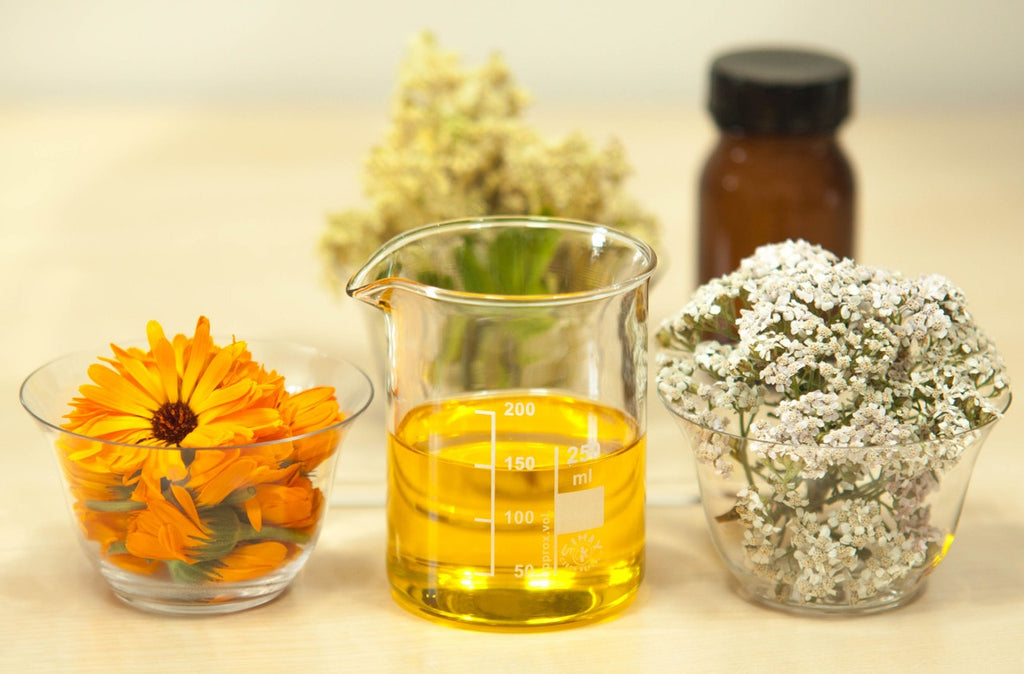Jojoba (pronounced ho-ho-ba) oil is a plant wax that comes from the seed of the genus plant Simmondsia Chinensis (Jojoba). This plant is cultured and cultivated in the plains of Northwestern Mexico, Southern Arizona, and Southern California. Although it is called ‘oil’, it is actually a liquid plant wax that constitutes half of the seed’s weight.
History
In the 1970’s, the sperm whale oil was banned nationwide so Jojoba oil was used as a replacement. It has become the primary oil used in cosmetics since then. The Native Americans learned the process of removing the oil from the seeds and used it to treat skin sores and bruises. This practice started the domestic use of Jojoba oil as one of the natural home remedies for common ailments.

Scent and Appearance
Jojoba oil has a faint nutty odor. It appears to be golden yellow in room temperature and unrefined state.

Composition
The chemical compounds present in Jojoba oil are monoesters of long chain fatty acids, alcohol and a few fractions of triglycerides. Its polyunsaturated wax state makes it more stable and has longer shelf-life compared to other oils such as safflower oil, canola oil, squalene, and almond oil.
- Palmitic Acid – one of the most common fatty acids present in plants and animal. It is known to have strong antioxidant properties.
- Stearic Acid – a saturated fatty acid that acts as a surfactant and softening agent
- Oleic Acid – a monosaturated omega-9 fatty acid that functions as a stabilizer for active ingredients
- Behenic Acid – a type of fatty acids that gives moisturizing and smoothing effects
- Nervonic Acid – a monosaturated fatty acid that is an essential component for the growth and maintenance of brain cell membranes.
- Vitamins E and B Complex – essential vitamins for maintaining skin tone and elasticity

Uses of Jojoba Oil
It is the predominant oil of choice to use as a to carrier oil for essential oils. However, Jojoba oil is commonly added to lotions, moisturizers, shampoos, conditioners, and other cosmetic products. It can also be used directly on skin, hair, nails, and cuticles.
Facial Moisturizer
The skin’s sebaceous glands secret oil called sebum. Sebum has a texture and functions that are very similar to Jojoba oil. They moisturize the skin. As the human body ages throughout the years, the sebaceous glands start to produce lesser sebum. Applying Jojoba oil acts as a sebum replacement when your body could no longer supply the skin requirements. Its Vitamin E content helps in reversing aging effects giving you that youthful glow.
Apply around 4 drops of Jojoba oil on your face at least twice a day, morning and night after cleansing your face. Use upward circular motion when applying on skin. It reduces wrinkles and facial skin dryness.
Hair Moisturizer
Jojoba oil is effective in helping hair growth. It has shown to treat alopecia caused my hair fungi. Aside from promoting hair growth, it has the capacity to assist in replenishing hair moisture, improving the texture of hair and eliminating fizz naturally.
Add 3-5 drops of Jojoba oil in a bottle of your favorite conditioner or place 2-3 drops on your palms and massage through your damp hair after showering. This is also an effective way to treat dry, flaky scalp or if you have dandruff. A Study in Maryland Medical Center has proven that you can increase hair growth by using a combination of Jojoba oil and essential oils. You can make your own hair grower solution by mixing a few drops of Earth Vibes Lavender Essential oil, Earth Vibes Rosemary Essential oil, Thyme oil, Cedarwood oil and about 1 ounce of Jojoba oil. Earth Vibes Argan Oil hair care line is infused with jojoba oil already!
Skin and Nail Fungicide
The anti-oxidants present in Jojoba oil make it a perfect protectant and skin cleanser. It inhibits the growth of bacteria that may lead to skin breakouts. The presence of complex fatty acids in Jojoba oil makes it the perfect antidote in treating fungi related skin, nails and cuticle problems. It strengthens the nail beds preventing nail chapping and brittleness. It is also beneficial in treating Athlete’s Foot by eliminating bacteria and fungi growing on the foot. It promotes skin healing and growth helping restore skin’s healthy state.
Lip Balm and Makeup Removal
The complex structure of Jojoba’s chemical composition allows it to function as a moisturizer as well as emollient. This is why using Jojoba oil as makeup remover has dual effects. It gets rid of the dirt and impurities as well as moisturizing the skin afterward. If you have cracked, dry lips, you can apply 1-2 drops of Jojoba oil when needed. It also gently but effectively removes makeup. Dab 3-5 drops on a cotton pad and wipe off makeup. Use upward and away motion to efficiently remove deep seated makeup.


